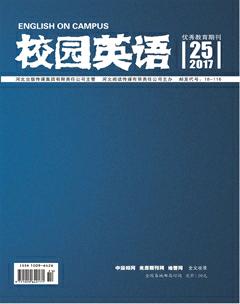The Application of Activity—Based Approach in PrimarySchool English Vocabulary Learning
2017-09-06赵彩霞
赵彩霞
【Abstract】English, as an international common language, draws a growing number of peoples attention in the world. In terms of the learners physical and psychological characteristics of being full of vitality, imitating, speaking and performing, Activity-Based Approach is a new-style teaching methodology fitting for primary school students. The study proposes that the Activity-Based Approach can play a significant role in the English vocabulary learning for primary school students through the empirical study.
【Key words】Activity-Based Approach; primary school; English vocabulary study
I. Introduction
English learning in primary school has been paid widespread attention for a long time. However, the vocabulary learning is boring, we need to pay more attention on relieving the students burden of study, motivating students to learn and helping them build self-confidence. Activity-Based Approach can not only help their language acquisition, but also experience variety of forms, interesting interactions, cognitive and communicative activities. Therefore, primary school students can learn in a happy and free environment. The purpose of the study is to explore whether Activity-Based Approach can promote English vocabulary learning for primary school students.
II. Literature Review
It has been universally acknowledged that vocabulary is important in foreign language learning. Abroad, Dell Harmer proposed A Balanced Activities Approach firstly in The practice of English Language teaching in 1983.In China, An Introduction to Teaching Activities by Tian Huisheng clearly introduced activities as a series of changes taken to adapt to certain goals in 2000. It is proved that Activity-Based Approach can help students to learn English vocabulary efficiently, arouse their interest in learning English and improve their enthusiasm. Furthermore, the study aims to help teachers achieve the teaching goals as well as teaching quality and help primary school students make great progress in English learning.
III. Research Discussion
The research subjects are 66 students in Class 1 and 2 of S Primary school with the almost similar English performance. Class 1 is control class by using traditional method, while Class 2 is experimental class by using Activity-Based Approach. Through the two-month experiment, the study gets the following results by using pre-test and post-test, with interview as the auxiliary instrument.endprint
a. The current English vocabulary performance in S primary school is not doing well, and it needs to be improved quickly;
b. Students who learn words by Activity-Based Approach have better scores. But the difference of average scores is not significant. It shows average scores of students from Class 1 (from 72. 27 to 74.24) and Class 2 (from 72.63 to 76.56). Traditional vocabulary learning and Activity-Based vocabulary learning have no obvious difference;
c. Students have different opinions about traditional vocabulary learning and Activity-Based vocabulary learning. However, learning vocabulary by Activity-Based Approach left a deep impression on students, students had a good command of the learned words. But they need to be led by teachers. And learning vocabulary by traditional method is effective in a short time. But it leads to forget quickly. The results show that students prefer the Activity-Based Approach on vocabulary learning to memorizing vocabulary.
IV. Implications for Activity-Based Approach Application
Finding an efficient strategy to learn vocabulary is a difficult thing for students. Activity-Based Approach is more efficient than traditional method in the aspect of vocabulary learning from the current theoretical research of foreign and domestic scholars. But there is no obvious differences between traditional and Activity-Based vocabulary learning in S primary school. Maybe some reasons like the limitation of time and number of students lead the results. But it not deny the Activity-Based Approach is a real way for vocabulary learning. Therefore, try our best to ensure the richness of time and people. Of course, it also should draw students attention to the experiment in the future research. Activity-Based Approach can not only help students to learn vocabulary, but also help teachers to teach vocabulary.
V. Conclusions
The short-term effect of Activity-Based Approach on vocabulary learning has been accepted so far. However, whether it is more suitable than any other methods to a particular group of students is still puzzling. By the instruction of Activity-Based Approachs theory, it will enrich English teaching activities and teaching methods in the future.
References:
[1]Harmer,J.The Practice of English Language Teaching[M].London:Longman Group Limited,1983.
[2]Krashen,S,Terrell.The Natural Approach[J].Hayward:Alemany Press,1983(4):27-52.
[3]王才仁.活動及活动教学法述[J].广西师范大学外语教学与研究,1994:40-41.endprint
